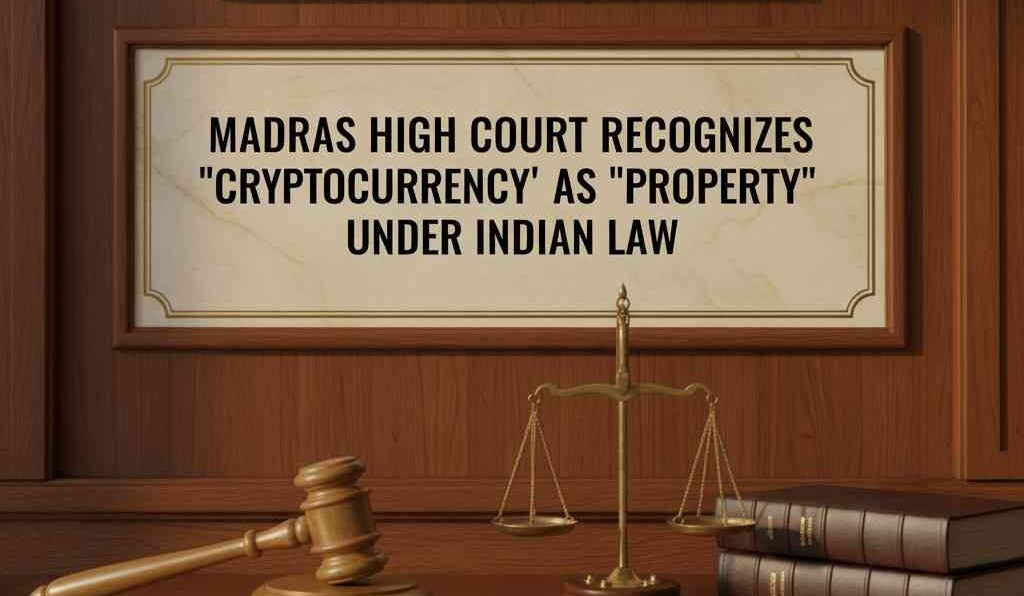Madras High Court Recognizes Cryptocurrency as Property under Indian law, marking a significant shift in how digital assets are viewed and protected. The Court has clarified that cryptocurrencies can be legally considered “property,” meaning they can be owned, transferred, inherited, held in trust, and defended under law. This decision offers stronger security for investors and may influence upcoming regulations and compliance responsibilities for crypto platforms in India.
Introduction
In a significant step for India’s digital finance sector, the Madras High Court has ruled that cryptocurrencies qualify as “property” under Indian law. This decision offers much-needed clarity in a space where legal definitions were previously uncertain. Even though India has yet to adopt a comprehensive regulatory framework for digital currencies, the court’s ruling confirms that crypto assets are legally protected and can be owned just like other forms of property.
Why This Decision Is Important
Cryptocurrencies have long operated in a legal grey zone in India. They are not recognized as official currency, yet millions of Indians trade and invest in them. By acknowledging crypto as property, the court has confirmed that these digital assets enjoy legal protection concerning ownership, transfer, inheritance, and dispute resolution.
This is especially significant for investors who have previously faced difficulties recovering funds after scams, exchange failures, or cyber-theft.
Understanding “Property” in the Indian Legal Context
In Indian law, the term “property” covers more than physical belongings. It also applies to intangible assets that hold value and can be exchanged or inherited. By grouping cryptocurrencies under this category, the Court affirmed that:
- Crypto assets can be lawfully owned and transferred.
- Their value can be recognized and measured.
- Ownership can be defended in court.
- They can be included in inheritance, trusts, and legal settlements.
This effectively places cryptocurrencies alongside other legally recognized intangible assets.
Key Impacts of the Ruling
Better Protection for Investors
Investors now have stronger legal standing to pursue recovery in cases of fraud, asset misappropriation, or unauthorized access to their crypto holdings.
Increased Accountability for Crypto Platforms
Exchanges may now be viewed as custodians of user property. As a result, they could face greater expectations regarding transparency and safeguarding user assets.
Clarity for Taxation and Estate Planning
Since crypto qualifies as property, it could be treated similarly to other assets during taxation and inheritance, reducing ambiguity in calculating gains or transferring ownership.
Moves India Closer to Regulatory Clarity
While a complete regulatory framework is still pending, the ruling could accelerate the government’s policy-making efforts.
What This Ruling Does Not Change
- Cryptocurrency is not recognized as legal tender. It cannot replace the Indian Rupee.
- The decision does not establish a complete regulatory system for crypto transactions.
- It does not imply blanket approval of all crypto-related activities. Compliance requirements still apply.
Frequently Asked Questions (FAQ)
Can cryptocurrency now be used like money in India?
Crypto is recognized as property, not currency. It cannot replace rupees in daily transactions.
Does this ruling make crypto trading fully legal?
The ruling clarifies ownership rights, but trading is still subject to existing tax and compliance regulations.
Are crypto exchanges now regulated?
They are not fully regulated yet, but this ruling increases their legal responsibility toward users.
Conclusion
The Madras High Court’s recognition of cryptocurrency as property marks a crucial step toward mainstream acceptance of digital assets in India. While the regulatory picture is still developing, this ruling provides reassurance to investors and encourages a more structured approach to crypto asset management across the country.

























